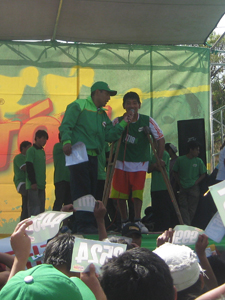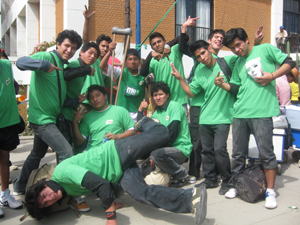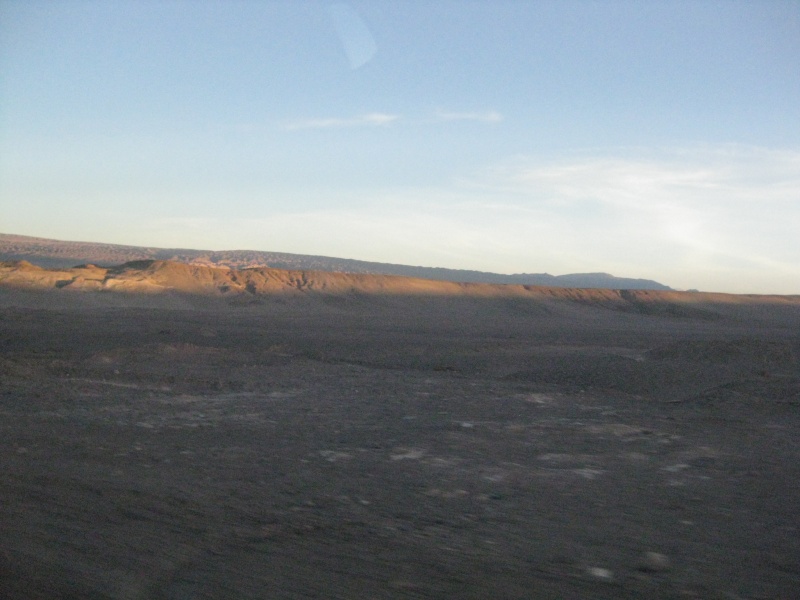The first phase of the project has finally come to an end. We have officially conducted sixty parent questionnaires in sixty homes to assess the general development of sixty babies. As we take our first peeks at the data we’ve collected and as we clarify and refine the approach for the second stage of the project (much to the surprise, confusion, and sometimes frustration of Maria and I), I have had more than a couple moments of the “What am I doing here?” sentiment.
There is first the “What am I doing here? I’m not right for this job. You have the wrong impression of me. Everyone has been introducing me as a ‘specialist,’ but that doesn’t mean my textbook knowledge is more valuable than your empirical experience. How can I give you advice on parenting? I’m not even a mother yet. I don’t think that I know enough to teach you anything new or to answer all of your questions properly. In fact, maybe I don’t know what I’m doing at all.”
Then there’s the “What am I doing here? I’m now realizing how massive this project is. How can we interpret the data properly? There is so much more that I need to know. Why do the mothers here behave the way they do? How much of this is attributable to culture? How much of the culture do I have yet to understand? How can I possibly contribute to this project if I don’t understand the people I’m studying? I should have locked myself in my room, reading about Peru, when I had the chance to in Nova Scotia. I should have at least travelled to Latin America before. I should have…”
Of the six different areas of development we evaluated, the most staggering outcome of the infant assessments was a clear deficit in infants’ social-emotional development. This area of development refers to their ability to manage or regulate their emotional and social behaviour in a way that society considers appropriate and acceptable. And this is where it gets tricky – what is “appropriate” and “acceptable” in this context and who decides?
Some examples of questions I had a difficult time consolidating:
- One of the questions on the social-emotional questionnaire asks something along the lines of: “Can your baby calm him/herself within a certain period of time if you leave his/her side?” We found that a decent chunk of mothers responded no to this question, but we also noticed that many mothers didn’t seem to be worried that their baby could not “regulate his/her emotions” as we would say in child-development-speak. “No, of course my baby can’t be without me,” was a classic answer. At the same time, over 90% of the mothers were amas de casa (housewives) who spend almost 100% of their time with their babies. Is it so surprising that their babies are not accustomed to being alone?
- Another question asks if the baby ever puts a banana to his ear, pretending it’s a telephone, or puts some other object on top of his head, pretending it’s a hat. I clearly remember one mother’s answer – in a tone suggesting that she was a little offended – which, to me, explains a common attitude towards pretending/imagination here, “If my baby knows it’s a banana, why would he use it as a telephone?” This strikes my “chicken and egg” curiosity – is this attitude a result of the living situation or does the lack of pretend play (which links to creativity) speak to the way people live here?
- During some of the interviews, Maria and I would sometimes notice violence being encouraged. “Go hit the pig to scare it out of the house.” “Throw something at the dog so it’ll stop eating out of the garden.” This had implications for one of the social-emotional questions that asks if the infant or child is ever violent towards other children or animals. But being commanded to be violent towards animals in this way doesn’t necessarily imply an inherent violent nature, neither at this age nor in the future.
The question, then, is whether we can make solid conclusions about the infants’ social-emotional development if it may be considered acceptable and appropriate, at least in some of the towns we visited, for babies to be unable to regulate their emotions without their mothers, for babies to not engage in pretend play, and for babies to show occasional violence towards animals.
Part of me feels a little disillusioned – I knew I couldn’t come here and be a hero, but I’m now recognizing a small part of me that wanted to save the world. There is the temptation to say, “This is how it works where I come from. You’re doing it all wrong. You should do it this way,” and to be harshly honest, I have met my share of development specialists who harbour this attitude. For this reason alone, I’ve found that it’s so important for me to say “I don’t know” and to not be afraid of admitting it. I’m not sure what’s best for you. How can I tell you that the North American theories of parenting are best, let alone that they apply in this context? I can’t make the conclusion that you don’t love your child because you don’t spend a lot of time with him/her – your priorities are drastically different and I respect that needing to survive can be more important than finding time to play with your child.
So, I have come full circle back to the approach I knew I should have had from the beginning – ultimately, this is about sharing. It’s about taking advantage of what little time we do have here to exchange preoccupations, thoughts, and ideas. I learn from you as much as you learn from me. I dispel some of your unawareness of the importance of play, for example, and you teach me the importance of simplicity and working hard. Your knowledge is just as valuable as mine if not more valuable. I am honoured to absorb your wisdom.





